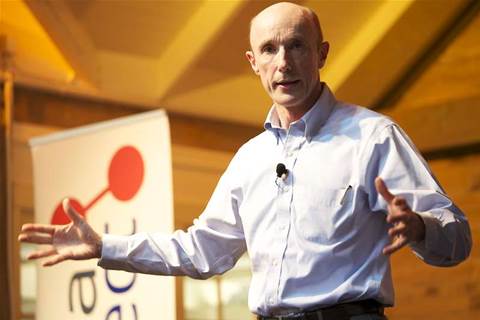The company building the national broadband network should be broken into geographic baby NBN Cos and a “Reserve Bank”-style oversight committee empanelled to counter an emerging anticompetitive monopoly, the chief executive officer of Australia’s No.2 telco said today.
Speaking to media and industry at a Gold Coast event, Optus CEO Paul O’Sullivan said there needed to be a greater level of transparency of the deals being struck by the Federal Government, Telstra and NBN Co.
O’Sullivan said the Singtel-owned Optus was worried that $11 billion of taxpayers’ money being pumped into the network would distort market forces and give incumbent Telstra an unfair competitive advantage when transferring customers from today’s networks to the new national fibre grid.
“Of particular concern is that these payments to Telstra will greatly distort the market in its early phases and allow Telstra to buy market share as customers [move to the NBN],” O’Sullivan said.
He called for a public debate on the “new monopoly” being created in NBN Co that would also look at monopolies in content and apps, such as Foxtel and Google.
“Make no mistake, as you’ve seen in early years of mobile and the internet there will be a land grab in the first years of the NBN and it will be stickier for customers because it will carry TV, broadband, customers may well be using a cloud service.”
“It will be a very difficult service to churn [for customers to change their providers].”
Break up NBN Co
To lay a “level playing field”, O’Sullivan said the Government should break up network architect NBN Co and impose strict regulations including the creation of an oversight committee based on the Reserve Bank model funded through the universal service obligation to award tenders every few years.
Accepting that the NBN was a done deal, O’Sullivan said passing the NBN bills before Parliament was “very important because without them we could easily see the creation of another Telstra”.
“If you’ve seen how long it has taken us to unravel the current Telstra, none of us wants the nightmare of going through the same process again – let’s not recreate sins of the past in the way we create the new NBN Co.”
He said that splitting NBN Co by state or geography would create a new layer of innovation in the telecommunications industry and “by periodically putting the operation and management of the NBN out to tender, NBN Co will be subject to the same market forces the commercial sector faces every day”.
The US Government started the breakup of monopoly telco AT&T into “baby Bells” in the mid ‘70s to foster competition but the regional operating companies began agglomerating in 1996 after the US deregulated the sector, indicating such a plan would need constant government intervention for it to work.
Wireless vs Fibre
But O’Sullivan saw eye-to-eye with NBN Co boss Mike Quigley on the role of wireless services such as 4G and long-term evolution as supplements to fibre for consumers and businesses.
O’Sullivan said with technology available now and in the foreseeable future, fibre would deliver superior results for fixed services. He said the appetite for high-speed, always-on connections for applications such as video would outpace wireless.
“The physics of mobile networks is we’ll never be able to carry the same capacity at the same speed simultaneously on wireless in the foreseeable future as on fibre,” he said. “Mobile will have its place but will always be a complementary product rather than a replacement for the fibre network.”
And he likened the spread of broadband to high-speed motorways – as they were laid, road users rushed to use them quickly soaking up excess capacity. In the same way, even wildly optimistic projections for broadband use would quickly be surpassed once users were exposed to them, he said.
Application and content providers also should be regulated, O’Sullivan said, because companies such as Google and Foxtel carried too much weight in the market. The Government should force them to offer their content to all-comers and even auction their website traffic to ensure they didn’t have too much power.
iiNet No.2 claims dismissed
And in an informal session attended by iTnews.com.au after his speech, O’Sullivan took a swipe at iiNet for claiming in its marketing that it was the No.2 ADSL internet service provider.
“[IiNet is] No.2 in DSL not in broadband,” he said. “If you take into account we operate a cable network and not ADSL [primarily] we’re still significantly larger than iiNet.
“We have just under one million households on broadband out of nine million households, [which] is reasonably large.
“We're still No.2 in broadband in Australia and as the NBN rolls out we intend to be the scale challenger.”
The writer attended Kickstart 2011 as a guest of Media Connect. Twitter hashtag #ks11.







_(21).jpg&h=142&w=230&c=1&s=1)





.jpg&w=100&c=1&s=0)







_(1).jpg&q=95&h=298&w=480&c=1&s=1)



